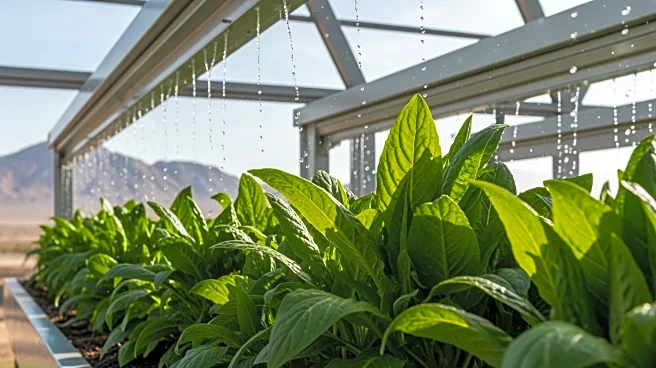What's Happening?
Mexico's protected agriculture industry, which includes greenhouses and shade houses, is experiencing significant growth driven by export demand and government incentives. However, the industry faces challenges
due to water scarcity, particularly in northern irrigated regions. Agriculture is the largest consumer of water and contributes to pollution through nitrogen fertilizer runoff. To address these issues, the industry is adopting advanced hydroponics and irrigation systems to improve water-use efficiency. Additionally, the sector is dealing with labor shortages as skilled workers migrate to the U.S. and Canada, prompting increased automation and robotics to maintain productivity.
Why It's Important?
The growth of Mexico's protected agriculture industry is crucial for its economy, as it supplies high-value fruits and vegetables to North American markets. The industry's ability to overcome water scarcity and labor challenges will determine its sustainability and competitiveness. Efficient water management and technological advancements are essential to maintain productivity and meet export demands. The industry's reliance on exports makes it vulnerable to international trade policies, such as tariffs, which can impact profitability. Addressing these challenges is vital for Mexico to continue being a leading supplier in the U.S. import market.
What's Next?
The Mexican Association of Protected Horticulture (AMHPAC) is initiating a project to formally measure the sector's water footprint to improve efficiency. The industry is also focusing on improving working conditions and training to stabilize its workforce. As Mexico transitions to renewable energy, the agricultural sector is expected to benefit from reduced electricity costs and improved reliability. The industry is exploring new markets, such as Asia, to diversify exports and reduce dependency on North American markets.
Beyond the Headlines
The industry's push towards climate-smart agriculture highlights the importance of sustainable practices in addressing environmental challenges. The adoption of clean energy and advanced technologies reflects a broader trend towards sustainability in agriculture. The industry's focus on high-value crops and export orientation underscores the economic significance of agriculture in Mexico's trade relations. The challenges faced by the industry, such as labor shortages and water scarcity, are indicative of broader issues in global agriculture that require innovative solutions.










